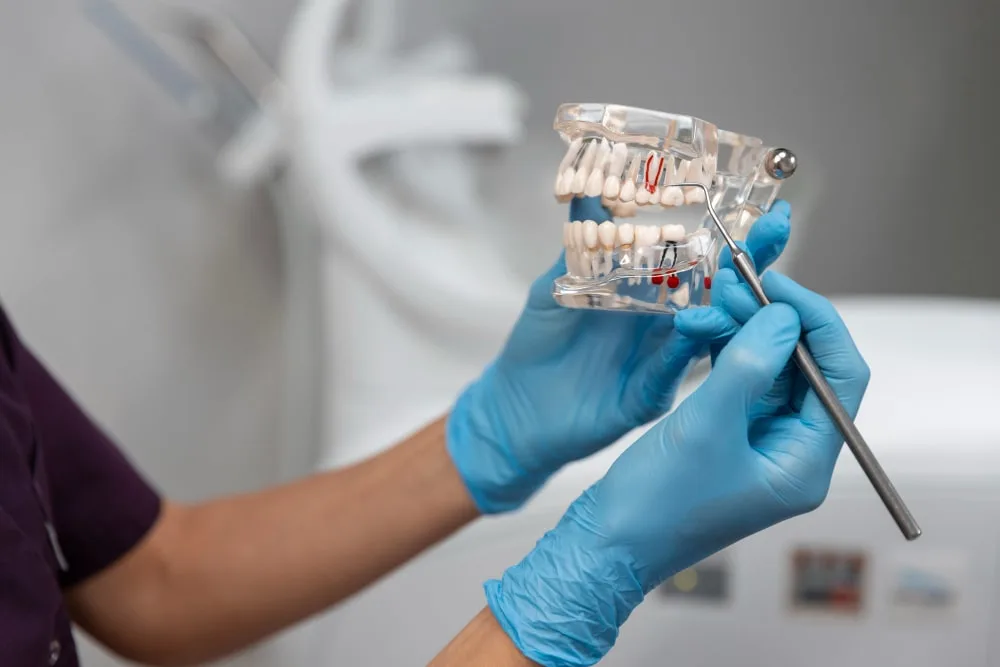If you’re considering dental implant surgery, you may be wondering whether you’ll be awake or asleep during the procedure. It’s a common concern, especially for patients who feel nervous about dental procedures or worry about pain. The idea of being awake during your surgery can make you feel a little bit uneasy.
The truth is, anesthesia for dental implants doesn’t always mean that you will be put to sleep during the procedure. Most of them are done under local anesthesia, simple numbing medicine injected into the gums. But, for more complex cases, an oral pill or IV sedation might be given. Only in rare cases is full general anesthesia given, but when necessary.
What are the Anesthesia Options Available for Dental Implants?
Dental implant surgery includes minor oral surgery, but ensuring the patient’s comfort is the topmost priority of every dentist. At Orchid Periodontics and Dental Implants, I take the time to personally explain all anesthesia options and discuss the best timing for your implant procedure with my clients.
Here’s a brief introduction, benefits & risks options I offer, and when they are most appropriate
Local anesthesia
Local anesthesia is the most common way I use to keep my patients comfortable during dental implant surgery. As it works by numbing only the surgical area, while you stay fully awake, you won’t feel sharp pain. Instead, you may notice some pressure, vibration, or movement during your work.
It is generally used for single implants. It’s considered quick, safe, and wears off after a few hours, allowing you to return home the same day. Unlike sedation or general anesthesia, local anesthesia doesn’t affect your awareness or ability to breathe on your own.
Benefits of Local Anesthesia
Local anesthesia is safe, effective, and provides several benefits:
Targeted pain control: It numbs only the surgical area without affecting the rest of your body.
- You stay fully awake and alert
- Quick recovery compared to other anesthetics
- Minimal side effects
- Ideal for simple cases
Risks of Local Anesthesia
Although local anesthesia has lower risks, some of the risks I want you to be aware of include:
- Temporary numbness or tingling
- Mild soreness or bruising at the injection site
- Allergic reaction, however rare
- Nerve irritation
- Incomplete numbness.
Overall, local anesthesia has minimal risks compared to the benefits, and is one of the most common options for routine dental procedures.
Sedation anesthesia
Sedation anesthesia is often used for anxious patients about dental implant surgery or for those undergoing longer and more complex procedures. Depending on the type, it can be given as an oral pill or through an IV line. With sedation, you remain conscious but in a deeply relaxed and drowsy state.
I typically recommend this to patients who want more than one implant being placed or to a person who has a strong fear of dental work. It allows you to feel calm, while I can work more efficiently and comfortably. Sedation often comes across as safe and effective.
Benefits of Sedation
Some of the benefits of sedation anesthesia are included below:
- Reduces anxiety for people who are nervous or fearful
- Customizable option
- Longer or more complex surgeries feel more comfortable
Risks of Sedation
- Drowsiness afterward you take the injection. You’ll need someone to drive you home and stay with you
- Some patients may require more medication if the first dose doesn’t achieve the desired effect.
- It is not recommended for people with certain health conditions, such as sleep apnea or heart/lung problems.
General anesthesia
General anesthesia is the deepest level of anesthesia given to a patient, and it’s rarely needed for dental implants. Under general anesthesia, you are completely unconscious, and your breathing is supported by specialized equipment. This option is recommended only for very complex cases, full-mouth reconstructions, or when a patient cannot tolerate treatment under lighter forms of anesthesia.
Benefits of General Anesthesia
- Complete unconsciousness
- Best for complex or extensive surgeries
- Controlled surgical environment
- Comfort and convenience
Risks of General Anesthesia
- Greater recovery time
- You cannot drive or return to normal activities for at least 24 hours
- Medical risks
- Requires a specialized setting
- Higher cost
Selecting the right anesthesia for dental implant surgery depends on your comfort level, the complexity of the procedure, and your overall health. From simple local anesthesia to sedation or, in rare cases, general anesthesia, there are safe and effective options to make your experience stress-free.



